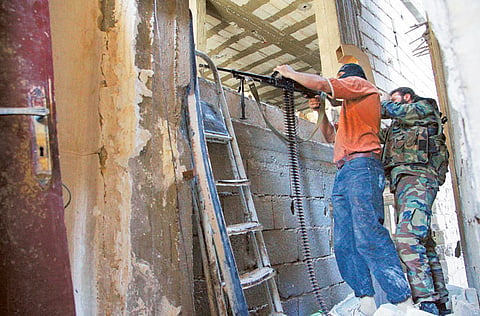Riyadh believes it’s duty bound to act on Syria
Analysis: Why Saudi Arabia has to topple Al Assad to thwart Iran

Beirut: King Abdullah Bin Abdul Aziz of Saudi Arabia cut short his holiday in Morocco and returned to Jeddah a few days ago “due to the repercussions of the events that are currently taking place in the region”, the state news agency SPA reported.
The decision was made after Washington altered its long-standing position not to provide military support to the Syrian Free Army. On Thursday, the United States announced a major shift in policy towards the Syrian crisis, though no details were available as to what kind of military aid would be sent.
For its part, Riyadh stepped up both its diplomatic efforts to persuade leading Western powers to change their positions following the fall of Qusayr, and pledged to transfer sorely needed surface-to-air and anti-tank missiles to assist rebel forces before an anticipated assault by President Bashar Al Assad’s forces — backed by Hezbollah and Iranian troops — on Aleppo.
Parallel to these developments, and as expected, a clash of wills between Western countries and Russia occurred at the Northern Ireland G8 conference, where Syria topped the agenda, especially after Moscow criticised Washington’s announcement that the US would arm opposition fighters.
On Sunday, Russian President Vladimir Putin called on Washington not to support “cannibals”, without referring to atrocities committed by Damascus that were repeatedly verified by international human rights organisations.
Additionally, the Russian Foreign Ministry said it would not allow an imposed no-fly zone in Syria and while US President Barack Obama and Putin met on Monday evening, there was little room for optimism. Press reports confirmed that the bilateral meeting was “chilly”.
It was within this context that Riyadh stepped up to the plate in Syria, aware that the struggle between it and Shiite Iran, the country that stood by Damascus, was an existential conflict, one whose goal was to establish the Velayat-e Faqih (Jurisconsult of God) throughout the Muslim World.
Riyadh believed that it was duty-bound to settle the Syrian civil war in favour of the Syrian people, not President Al Assad and his allies. Towards that end, it decided to deny Iran a victory and to reject, once and for all, the long-standing Khomeini plan to export the revolution to the rest of the Muslim World. Indeed, Riyadh understood that Damascus has become the hub of Iranian political and military activities, especially after GCC states ended previous adventures in Bahrain and Yemen.
Consequently, it was increasingly clear that Saudi Arabia would do everything in its power to end the Syrian-Iranian alliance, especially since a Tehran victory in the Levant would literally alter the balance of power in the Muslim World. At a time when Gulf unity discussions stalled because two Gulf States were keen to satisfy Tehran, King Abdullah was not willing to jeopardise the Kingdom’s regional and international leadership roles. He was certainly aware that leading Western powers were pragmatic enough to buy Iranian oil that reached them through the Abadan-Tartous pipeline, and that others were contemplating an Iranian plan to connect their output to the European gas network despite lofty sanctions.
Given these circumstances, and because the Saudi monarch knew that Saudi Arabia could only rely on itself, he chose to assume his responsibilities to the hilt. This was his battle to protect Saudi Arabia’s security and, through it, the safety of over a billion Muslims.
Sign up for the Daily Briefing
Get the latest news and updates straight to your inbox



